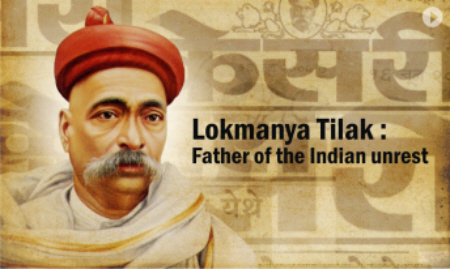Bal Gangadhar Tilak (23 July 1856 – 1 August 1920), born as Keshav Gangadhar Tilak, was an Indian nationalist, teacher, social reformer, lawyer and an independence activist. He was the first leader of the Indian Independence Movement. The British colonial authorities called him “Father of the Indian unrest.” He was also conferred with the honorary title of “Lokmanya”, which literally means “accepted by the people (as their leader)”.
 Tilak was one of the first and strongest advocates of “Swaraj” (self-rule) and a strong radical in Indian consciousness. He is known for his quote “Swarajya is my birthright and I shall have it!” in India. He formed a close alliance with many Indian National Congress leaders including Bipin Chandra Pal, Lala Lajpat Rai,Aurobindo Ghose, V. O. Chidambaram Pillai and Muhammad Ali Jinnah. As a strong advocate of Swaraj, he was against Gandhi’s policy of Total-ahimsa (non-violence), satyagraha and advocated the use of force where necessary.
Tilak was one of the first and strongest advocates of “Swaraj” (self-rule) and a strong radical in Indian consciousness. He is known for his quote “Swarajya is my birthright and I shall have it!” in India. He formed a close alliance with many Indian National Congress leaders including Bipin Chandra Pal, Lala Lajpat Rai,Aurobindo Ghose, V. O. Chidambaram Pillai and Muhammad Ali Jinnah. As a strong advocate of Swaraj, he was against Gandhi’s policy of Total-ahimsa (non-violence), satyagraha and advocated the use of force where necessary.
Tilak started two weeklies, Kesari (“The Lion”) in Marathi and Maratha in English in 1880–81 with Gopal Ganesh Agarkar as the first editor. By this he was recognized as ‘awakener of India’. As Kesari later became a daily and continues publication to this day.
Following the Partition of Bengal, which was a strategy set out by Lord Curzon to weaken the nationalist movement, Tilak encouraged the Swadeshi movement and the Boycott movement. The movement consisted of the boycott of foreign goods and also the social boycott of any Indian who used foreign goods. The Swadeshi movement consisted of the usage of natively produced goods. Once foreign goods were boycotted, there was a gap which had to be filled by the production of those goods in India itself. Tilak said that the Swadeshi and Boycott movements are two sides of the same coin.
Taking advantage of the division in the nationalist forces in 1907, the government prosecuted Tilak on a charge of sedition and inciting terrorism and deported him to Mandalay, Burma (Myanmar), to serve a six-year prison sentence. In the Mandalay jail, Tilak settled down to write his magnum opus, the Śrīmad Bhagavadgitā Rahasya (“Secret of the Bhagavadgita”)
Tilak re-united with his fellow nationalists and re-joined the Indian National Congress in 1916. He also helped found the All India Home Rule League in 1916–18, with G. S. Khaparde and Annie Besant. After years of trying to reunite the moderate and radical factions, he gave up and focused on the Home Rule League, which sought self-rule. Tilak travelled from village to village for support from farmers and locals to join the movement towards self-rule. Tilak started his Home Rule League in Maharashtra, Central Provinces, and Karnataka and Berar region. Besant’s League was active in the rest part of India.